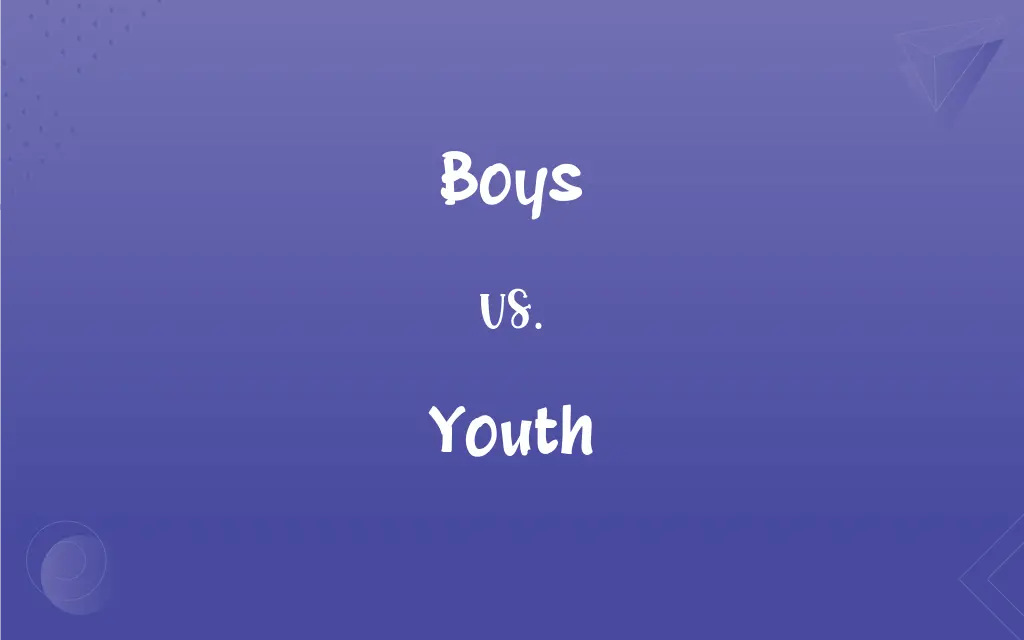Boys vs. Youth: What's the Difference?
By Janet White || Updated on October 3, 2023
"Boys" refers specifically to young male individuals, typically children and teenagers, while "Youth" is a more general term that encompasses both young males and females and can refer to the early stage of life.

Key Differences
"Boys" is a term that specifically denotes young male individuals. Typically, this term is used to describe those who are children or teenagers. "Youth," on the other hand, is a broader term that can encompass both young males and females and can be used to indicate an entire age group or period in one's life.
The term "Boys" carries with it more specific connotations and is often used when gender distinction is necessary or pertinent to the context. "Youth," conversely, is a more general term that is gender-neutral and often used to refer to a collective of young people, like a youth group or youth activities.
From a grammatical standpoint, "Boys" is a plural noun, representing multiple young males. "Youth" can be both singular and plural but often employs collective singular use when referring to the general state or time of being young, as in "the folly of youth."
"Boys" has its origins in Old English, specifically the word "boia," which means servant or commoner. "Youth," however, comes from the Old English word "geoguð," which is a collective term for young people. Both words have evolved over time to narrow or expand their scope, but the core meanings have remained the same: "Boys" refers to young males, and "Youth" refers to the general state or period of being young.
Comparison Chart
Gender Specificity
Male only
Gender-neutral
ADVERTISEMENT
Plurality
Always plural
Singular and plural
Scope
Specific age and gender
Broad age range, both genders
Context
Often personal or familial
Often collective or societal
Etymology
Old English "boia"
Old English "geoguð"
Boys and Youth Definitions
Boys
Males involved in a particular group or activity.
The boys in the band are talented.
ADVERTISEMENT
Youth
The period of being young.
Youth is often a time of exploration.
Boys
A term of camaraderie among adult men.
The boys are going out for drinks tonight.
Youth
A young person, male or female.
A youth approached me for directions.
Boys
Young male children.
The boys played soccer in the park.
Youth
The qualities or characteristics of being young.
He has the energy and enthusiasm of youth.
Boys
Sons or male descendants.
The boys inherited the family business.
Youth
The condition or quality of being young
Travel while you still have your youth.
Boys
Male adolescents.
The boys are studying for their exams.
Youth
The time of life between childhood and maturity
He was rebellious in his youth.
Boys
A male child.
Youth
An early period of development or existence
A nation in its youth.
Boys
A son
His youngest boy.
Youth
A young person, especially a young male in late adolescence.
Boys
Often Offensive A man, especially a young man.
Youth
(used with a sing. or pl. verb) Young people considered as a group.
Boys
(Informal) A man socializing in a group of men
A night out with the boys.
Youth
(Geology) The first stage in the erosion cycle.
Boys
(Offensive) A male servant or employee.
Youth
(uncountable) The quality or state of being young.
Her youth and beauty attracted him to her.
Boys
Used to express mild astonishment, elation, or disgust
Oh boy—what a surprise!.
Youth
(uncountable) The part of life following childhood; the period of existence preceding maturity or age; the whole early part of life, from childhood, or, sometimes, from infancy, to adulthood.
Make the most of your youth, it will not last forever.
I made many mistakes in my youth, but learned from them all.
Boys
Plural of boy
Youth
(countable) A young person.
There was a group of youths hanging around the parking lot, reading fashion magazines and listening to music.
Boys
(slang) The testicles.
Youth
(countable) A young man; a male adolescent or young adult.
Youth
Young persons, collectively.
Youth
The quality or state of being young; youthfulness; juvenility.
Such as in his faceYouth smiled celestial.
Youth
The part of life that succeeds to childhood; the period of existence preceding maturity or age; the whole early part of life, from childhood, or, sometimes, from infancy, to manhood.
He wondered that your lordshipWould suffer him to spend his youth at home.
Those who pass their youth in vice are justly condemned to spend their age in folly.
Youth
A young person; especially, a young man.
Seven youths from Athens yearly sent.
Youth
Young persons, collectively.
It is fit to read the best authors to youth first.
Youth
A young person (especially a young man or boy)
Youth
Young people collectively;
Rock music appeals to the young
Youth everywhere rises in revolt
Youth
The time of life between childhood and maturity
Youth
Early maturity; the state of being young or immature or inexperienced
Youth
An early period of development;
During the youth of the project
Youth
The freshness and vitality characteristic of a young person
Youth
Young people collectively.
The youth are our future.
Youth
A term for young men, less commonly used.
The youth were seen hanging around the mall.
FAQs
Is Youth always plural?
No, "Youth" can be both singular and plural.
Is the term Boys gender-specific?
Yes, "Boys" refers to young males only.
What is the primary difference between Boys and Youth?
"Boys" refers specifically to young males, while "Youth" can refer to young people of both genders.
What is the etymology of Youth?
It comes from the Old English word "geoguð."
Are Boys and Youth synonymous?
No, they differ in gender specificity and scope.
Is Boys used in a familial context?
Often, as in "my boys" referring to sons.
Is Youth a gender-neutral term?
Yes, "Youth" is gender-neutral.
What age range does Boys cover?
Typically, children to teenagers.
Is Youth ever used to describe qualities?
Yes, as in "the folly of youth."
Can Boys refer to a group activity?
Yes, like "the boys in the band."
Can Boys refer to adults?
Rarely, usually in colloquial contexts as a term of camaraderie.
What is the etymology of Boys?
It comes from the Old English word "boia."
Can Boys be used metaphorically?
Rarely, it is generally literal, referring to young males.
Can Youth refer to a singular person?
Yes, it can refer to a single young person.
What age range does Youth cover?
Generally, it refers to the stage of being young, from childhood to young adulthood.
About Author
Written by
Janet WhiteJanet White has been an esteemed writer and blogger for Difference Wiki. Holding a Master's degree in Science and Medical Journalism from the prestigious Boston University, she has consistently demonstrated her expertise and passion for her field. When she's not immersed in her work, Janet relishes her time exercising, delving into a good book, and cherishing moments with friends and family.































































